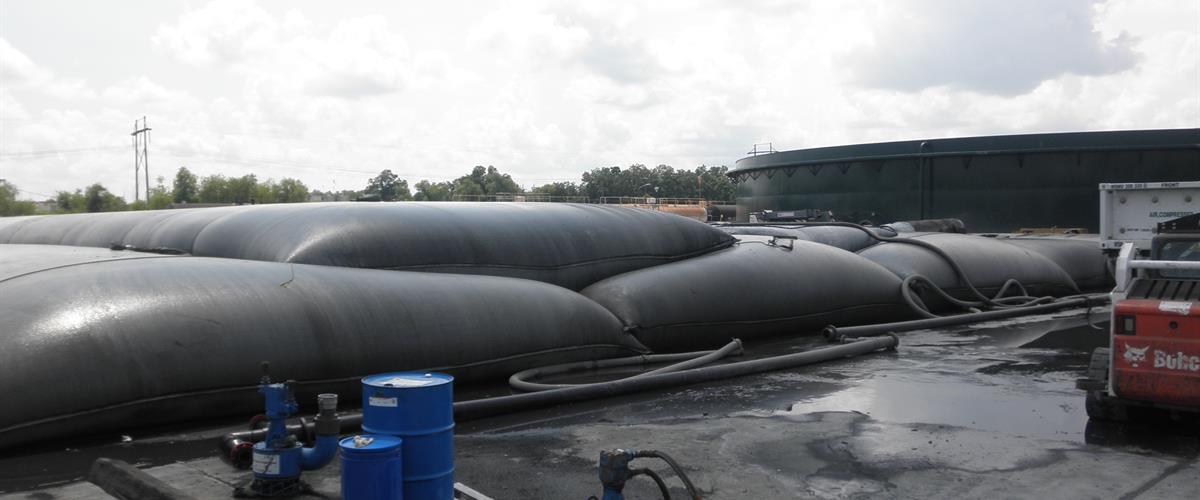Are you looking for an efficient, sustainable, and cost-effective solution for your sludge dewatering needs?
Perhaps you manage a water treatment facility and are looking for ways to improve your solids handling processes. Or maybe you are responsible for a restoration project and need to dispose of the waste materials in an environmentally-friendly manner.
Whatever the case may be, sludge dewatering bags could be the answer. Dewatering bags for sludge are designed to filter and contain solids while discharging water away. This leaves you with a dry product that is easy to transport and dispose of responsibly.
Let’s take a deeper dive into what sludge dewatering bags are, how they work, and some of the benefits they offer.
What is a Sludge Bag Dewatering System?
Sludge dewatering bags are constructed of permeable geotextile fabric. This means water can pass through the material while solids are contained inside the bag.
A sludge bag dewatering system consists of:
- One or more sludge bags
- A specially designed frame that holds the bag(s) in place
- Geotextile tubes for pumping out the collected water.
The water exits through a tube using internal pressure. The water is filtered as it passes through, while the solid particles are contained inside the bag.
Industries That Use Sludge Dewatering Bags
Wastewater sludge dewatering bags are used in a variety of industries and applications. Some of the most common include:
Industrial Sludge Removal:
Many industrial facilities generate sludge as a by-product of their manufacturing processes. This sludge can include various contaminants, such as metals, chemicals, and other pollutants. Dewatering bags allow these companies to dispose of this sludge while meeting biosolid laws and regulations.
Agricultural Waste Dredging
Runoff from agricultural operations can often contain high sludge levels. Agricultural wastewater sludge dewatering bags make it easy to remove these solids and prevent them from contaminating waterways.
Beach/Environment Restoration
After a natural disaster or man-made event, beaches and other natural areas can become polluted with debris and sludge. Dewatering bags can be used to clean up these areas quickly and reduce environmental damage.
Construction
Dewatering bags for sludge are frequently used for applications involving oil and other chemicals in the construction industry. The contained solids can then be reused or disposed of, reducing costs and environmental impact.
Marine Dredging
Dredging is often necessary to keep waterways clear for shipping traffic. Dewatering bags can be used to remove sludge and sediment from these areas without harming the ecosystem.
Wastewater Removal:
Treatment plants often use sludge dewatering bags in the early stages of wastewater treatment. This is a quick and easy way to separate contaminated biosolids and produce clean water to release back into the environment.
The Benefits of Using a Sludge Bag Dewatering System
There are many reasons why you might want to consider using a sludge bag dewatering system. Some of the most notable benefits include:
- Works for a Variety of Materials: Sludge dewatering bags can be used for many different material types, including sand, sediment, and agricultural waste.
- Reduced Costs: Dewatering bags offer a low-cost alternative to the more traditional pump and haul methods, which carry a high price tag.
- Different Size Options: Dewatering bags come in various sizes to accommodate different needs. This flexibility allows you to find the perfect solution for your specific application.
- Reusable: In many cases, dewatering bags for sludge can be reused. When the solid particles are removed, the bag can be cleaned and used again to minimize environmental impact and costs.
Why Dewatering Bags Are Better Than Dewatering Boxes?
While dewatering boxes are another popular option for sludge removal, bags offer some distinct advantages.
For starters, dewatering boxes are often expensive to rent and difficult to obtain, especially for smaller operations. Conversely, dewatering bags for sludge are widely available and easy to rent for both short-term and long-term applications.
Additionally, dewatering boxes require pumps to force water through the system - which adds significant costs. Most importantly, you have more flexibility with bags than with boxes – and they break down much smaller.
How Dewatering Bags Benefit the Environment?
Wastewater sludge dewatering bags offer many environmental benefits over other methods of sludge removal.
For instance, the decanted water can be reused or discharged into local water tables, streams, or storm drainage systems. This helps to conserve water and limit pollution. Moreover, dewatering bags can be reused multiple times, reducing the need to create new materials. They also don’t require heavy equipment, which leaves a smaller footprint.
The Bottom Line
Overall, sludge dewatering bags offer many benefits for both users and the environment. If you're looking for a low-cost, reliable method of sludge removal, these bags are an excellent option to consider.
Are you looking to use a sludge bag dewatering system on your next project?
Get a free, no-obligation quote today!




